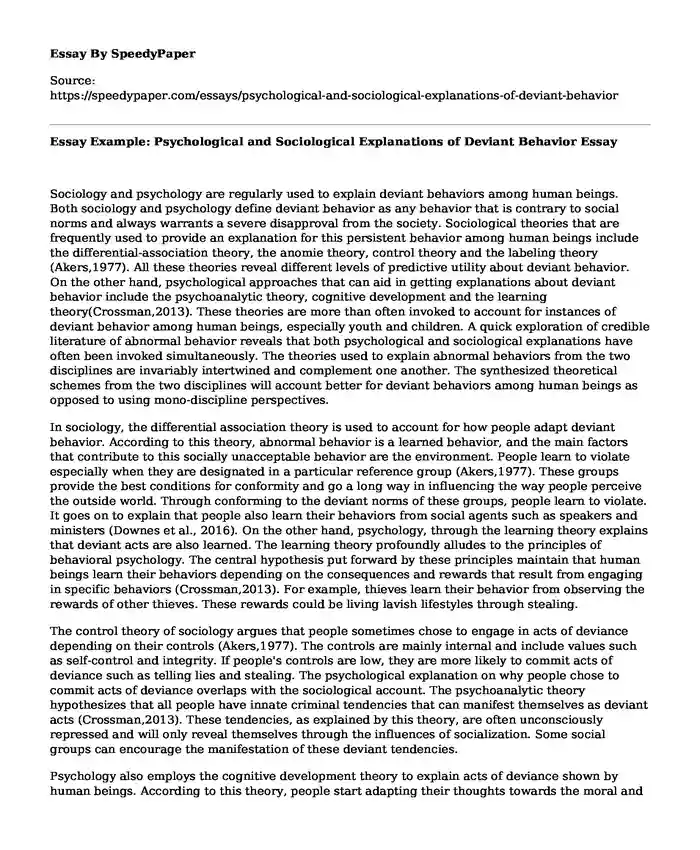
| Type of paper: | Essay |
| Categories: | Psychology Sociology Behavior |
| Pages: | 3 |
| Wordcount: | 684 words |
Sociology and psychology are regularly used to explain deviant behaviors among human beings. Both sociology and psychology define deviant behavior as any behavior that is contrary to social norms and always warrants a severe disapproval from the society. Sociological theories that are frequently used to provide an explanation for this persistent behavior among human beings include the differential-association theory, the anomie theory, control theory and the labeling theory (Akers,1977). All these theories reveal different levels of predictive utility about deviant behavior. On the other hand, psychological approaches that can aid in getting explanations about deviant behavior include the psychoanalytic theory, cognitive development and the learning theory(Crossman,2013). These theories are more than often invoked to account for instances of deviant behavior among human beings, especially youth and children. A quick exploration of credible literature of abnormal behavior reveals that both psychological and sociological explanations have often been invoked simultaneously. The theories used to explain abnormal behaviors from the two disciplines are invariably intertwined and complement one another. The synthesized theoretical schemes from the two disciplines will account better for deviant behaviors among human beings as opposed to using mono-discipline perspectives.
In sociology, the differential association theory is used to account for how people adapt deviant behavior. According to this theory, abnormal behavior is a learned behavior, and the main factors that contribute to this socially unacceptable behavior are the environment. People learn to violate especially when they are designated in a particular reference group (Akers,1977). These groups provide the best conditions for conformity and go a long way in influencing the way people perceive the outside world. Through conforming to the deviant norms of these groups, people learn to violate. It goes on to explain that people also learn their behaviors from social agents such as speakers and ministers (Downes et al., 2016). On the other hand, psychology, through the learning theory explains that deviant acts are also learned. The learning theory profoundly alludes to the principles of behavioral psychology. The central hypothesis put forward by these principles maintain that human beings learn their behaviors depending on the consequences and rewards that result from engaging in specific behaviors (Crossman,2013). For example, thieves learn their behavior from observing the rewards of other thieves. These rewards could be living lavish lifestyles through stealing.
The control theory of sociology argues that people sometimes chose to engage in acts of deviance depending on their controls (Akers,1977). The controls are mainly internal and include values such as self-control and integrity. If people's controls are low, they are more likely to commit acts of deviance such as telling lies and stealing. The psychological explanation on why people chose to commit acts of deviance overlaps with the sociological account. The psychoanalytic theory hypothesizes that all people have innate criminal tendencies that can manifest themselves as deviant acts (Crossman,2013). These tendencies, as explained by this theory, are often unconsciously repressed and will only reveal themselves through the influences of socialization. Some social groups can encourage the manifestation of these deviant tendencies.
Psychology also employs the cognitive development theory to explain acts of deviance shown by human beings. According to this theory, people start adapting their thoughts towards the moral and legal boundaries of the society (Crossman,2013). They learn how and when to successfully evade punishment by breaking the moral and legally binding principles of the society. This nature deviant acts among human beings. The sociological theory of anomie is similar to the former theory. According to the anomie theory, people start deviating from normal behaviors when the society dictates goals to achieve and do not prove a roadmap to achieve those goals (Akers,1977). This means that people have to circumvent the legal and moral barriers to meet the expectations of the society. In a nutshell, the psychological and sociological theories should be applied simultaneously to account for acts of deviance among human beings.
References
Crossman, A. (2013). Psychological Explanations of Deviant Behavior.
Downes, D., Rock, P., & McLaughlin, E. (2016). Understanding deviance: a guide to the sociology of crime and rule-breaking. Oxford University Press.
Akers, R. L. (1977). Deviant behavior: A social learning approach.
Cite this page
Essay Example: Psychological and Sociological Explanations of Deviant Behavior. (2022, Mar 18). Retrieved from https://speedypaper.net/essays/psychological-and-sociological-explanations-of-deviant-behavior
Request Removal
If you are the original author of this essay and no longer wish to have it published on the SpeedyPaper website, please click below to request its removal:
- Choice of Outline and Model, Free Essay Sample
- Essay Example: The Culture of a Country Is in the Art of Its Currency
- Free Essay Sample with Camille Dreyfus Biography
- Essay Example on Gender Differences in Listening
- Free Essay: The Link Between Business Strategy and Human Resource Management (HRM)
- Essay Example for Students: American Economic Crisis
- Reinforcement Schedules: When & How To Reinforce Behaviour - Essay Sample
Popular categories




